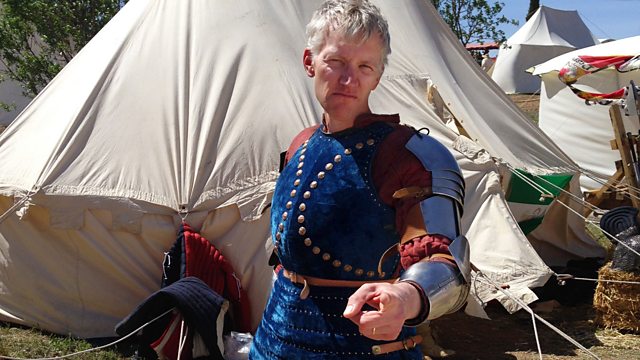Dark tourism, World Cup 1938, The mobile library
Helen Castor presents stories from the past with a bearing on issues today, including dark tourism, the politics of the 1938 World Cup and the start of the mobile library service.
Helen Castor presents the popular history magazine. She's joined by Dr Jane Hamlett from Royal Holloway University of London.
It's 140 years since the UK prison system was nationalised and Iszi Lawrence visits Shrewsbury with Professor Alyson Brown from Edge Hill University to discover why a change in organisation was needed. Today, paying customers are experiencing life here at Her Majesty's pleasure - and all over the world people seem to want to visit places which have a grim and troubling past. So what's the appeal and the purpose of so-called "dark tourism"? Tom Holland talks to Dr Philip Stone from the University of Central Lancashire.
The 2018 World Cup in Russia came at a time when President Putin's stock was high at home, but on the floor abroad. Not for the first time, football was seen as having the potential to offer a political leader a global platform. We go back to France '38 which was held against a backdrop of a growing global diplomatic crisis. Sports writer Julie Welch is joined by Professor Simon Martin and football journalist Jonathan Wilson to explain how, with civil war in Spain, the merging of the Austrian and German teams after the Nazi Anschluss and Mussolini promoting his brand of fascism through football, this really was a tournament with all to play for.
Council budget cuts, E-readers and on-line delivery are all presenting challenges to Britain's library service, and mobile libraries in particular have been badly affected. But when did the library van first start doing its rounds? Author of Mobile Library, David Whitehouse, heads back home to Nuneaton and the mobile library his mother used to clean.
A Pier production for ����ý Radio 4
Last on
Guests
Helen Castor is joined by Dr Jane Hamlett .
World Cup ’38
The 2018 World Cup in Russia was marred by the poison attack in Salisbury, which led to calls for British teams to boycott the competition. Of course, sport and politics have been linked for decades. As Britain’s first female football correspondent, Julie Welch, reminds us, eighty years ago in France the international situation was such that many of the best teams didn’t show and the Italians once more used football to promote their brand of fascism.
��
Joining Julie are and
Mobile Libraries
Our mobile library services are being cut, but where did the idea of taking books to borrowers come from? The author of the novel Mobile Library, goes back home to Nuneaton in Warwickshire to find out more.
��
David joins the Bedworth library van which is operated by and he meets up with Dr Cath Feely an historian (and former librarian) who is based at
Top Town History can Gina Antczak from the tiny New Forest village of East Boldre see off the Mercian might of Mark Wilson’s Lichfield?
Prison Nationalisation
Iszi Lawrence visits which was closed in 2013 and is now�� used for heritage tours and stag & hen ‘do’s. There she meets a historian of prisons, to find out about Britain’s first nationalisation, the which came into force 140 years ago and did away with local financing and control of jails.
��
Shrewsbury is now used for fun and education. It’s part of a global, billion fund industry that’s known as Tom Holland spoke to Dr Philip Stone from to find out more about this sometimes difficult use of history.
��
��
Making History is produced by Nick Patrick
��
Email the programme making.history@bbc.co.uk
��
A Pier Production
Broadcasts
- Tue 5 Jun 2018 15:30����ý Radio 4
- Thu 22 Aug 2019 20:00����ý Radio 4
Podcast
-
![]()
Making History
Popular history series where the past connects with the present.


